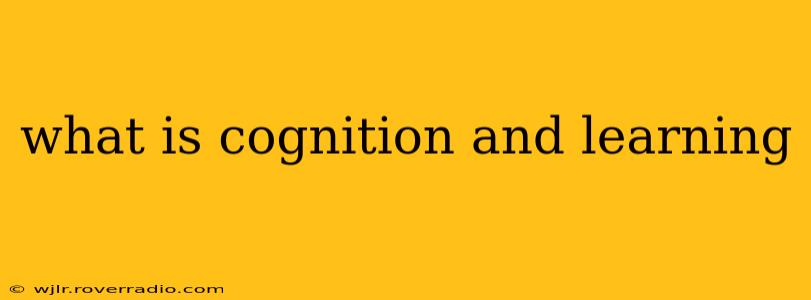Cognition and learning are deeply intertwined processes fundamental to understanding how we acquire knowledge, solve problems, and navigate the world. While distinct, they're inseparable aspects of human (and animal) experience. This exploration will delve into the nuances of each, highlighting their interconnectedness and practical implications.
What is Cognition?
Cognition refers to the mental processes involved in acquiring knowledge and understanding through thought, experience, and the senses. It encompasses a wide range of higher-level functions, including:
- Perception: How we interpret sensory information from our environment.
- Attention: Focusing on specific stimuli while filtering out distractions.
- Memory: Encoding, storing, and retrieving information. This includes both short-term and long-term memory, as well as different types like procedural (how to do things) and declarative (facts and events).
- Language: Understanding and producing spoken and written communication.
- Problem-solving: Identifying issues, formulating solutions, and evaluating outcomes.
- Decision-making: Weighing options and selecting a course of action.
- Reasoning: Drawing inferences and conclusions from available information.
Cognition is not a single, unified process but rather a complex interplay of these different mental functions. It shapes how we interact with the world, make sense of our experiences, and adapt to changing circumstances. Neuroscience investigates the brain structures and neural pathways underlying these cognitive processes.
What is Learning?
Learning is a relatively permanent change in behavior or knowledge as a result of experience. It's a dynamic process involving the acquisition, modification, or strengthening of information, skills, or attitudes. Several key features define learning:
- Experience-dependent: Learning arises from interactions with the environment.
- Behavioral change: Learning often manifests in observable behavioral modifications.
- Relatively permanent: While some learning is temporary, most learning results in lasting changes.
Different theories of learning exist, offering various perspectives:
- Behaviorism: Focuses on observable behaviors and the role of environmental stimuli in shaping learning (classical and operant conditioning).
- Cognitivism: Emphasizes internal mental processes, such as memory, attention, and problem-solving, in learning.
- Constructivism: Highlights the active role of the learner in constructing knowledge through experience and interaction.
How are Cognition and Learning Related?
Cognition and learning are inextricably linked. Learning relies on cognitive processes to occur. For instance, to learn a new language, you need to use cognitive processes like memory (to remember vocabulary), attention (to focus on the lesson), and perception (to understand the sounds of the language). Conversely, cognitive processes are constantly refined and enhanced through learning. The more you learn, the more efficient and effective your cognitive abilities become.
How Does Cognition Influence Learning?
Cognitive abilities directly impact the effectiveness of learning. For example:
- Working memory capacity: Individuals with higher working memory capacity can process and retain more information simultaneously, making learning more efficient.
- Attentional control: The ability to focus attention selectively is crucial for effective learning, particularly in distracting environments.
- Metacognition: Awareness and understanding of one's own cognitive processes (e.g., knowing your learning style) can significantly improve learning strategies.
What are some common cognitive learning strategies?
Many effective learning strategies draw upon our cognitive abilities. These include:
- Spaced repetition: Reviewing material at increasing intervals strengthens memory.
- Active recall: Testing oneself without looking at the material enhances retention.
- Elaboration: Connecting new information to existing knowledge creates deeper understanding.
- Interleaving: Mixing different subjects or topics during study improves long-term retention.
What are the challenges in understanding cognition and learning?
Understanding cognition and learning is a complex undertaking, fraught with challenges:
- Measurement issues: Measuring cognitive processes and learning outcomes can be difficult and subjective.
- Individual differences: People learn and process information differently due to variations in cognitive abilities, learning styles, and experiences.
- The black box problem: We can observe behaviors and outcomes, but the internal cognitive processes are often hidden and difficult to directly investigate.
In conclusion, cognition and learning are fundamental aspects of human experience, intertwined in a complex dance of mental processes and environmental interactions. Understanding their relationship is crucial for improving educational practices, optimizing learning strategies, and addressing cognitive impairments. Ongoing research continues to unravel the mysteries of the mind, revealing more about how we learn and how we can learn more effectively.
